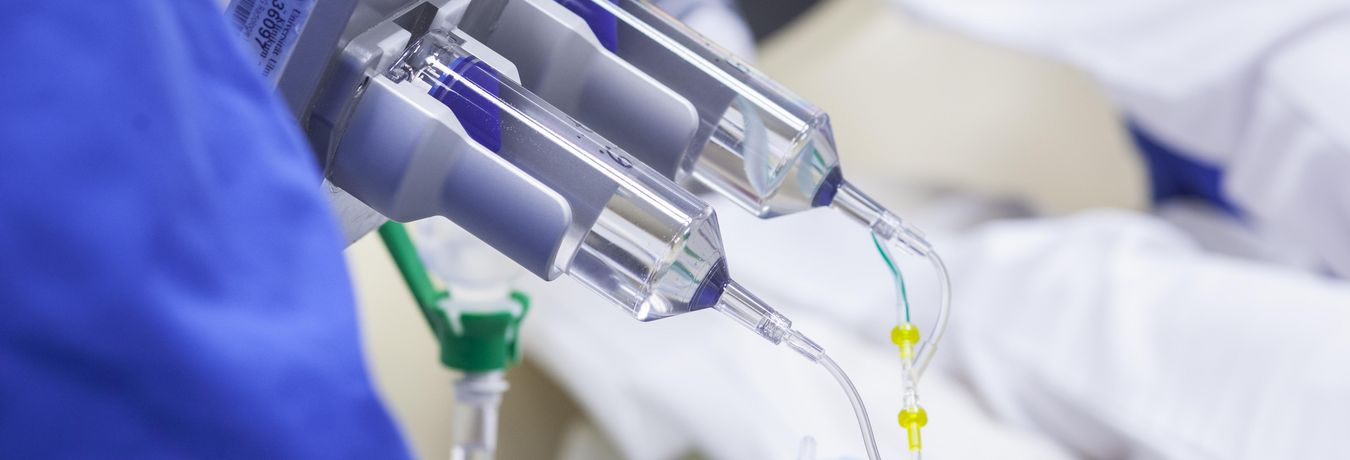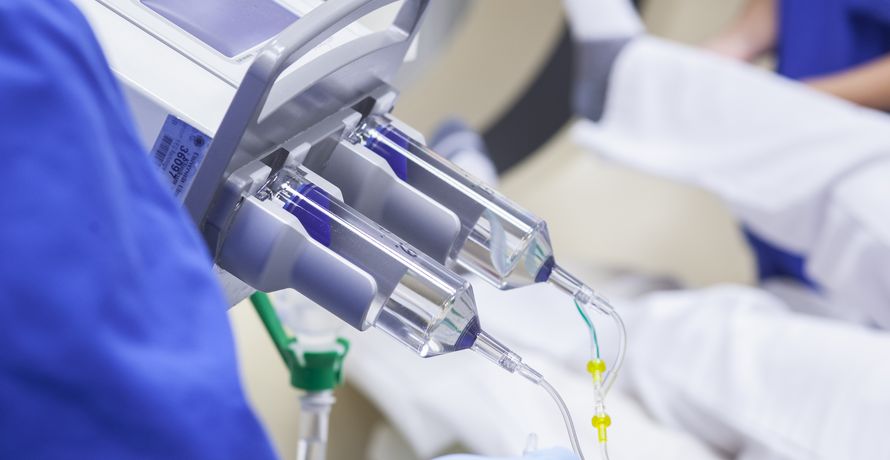Radiologische Untersuchungen - Orientierungshilfe
Diese Tabelle bietet eine Übersicht über häufige medizinische Fragestellungen und die jeweils empfohlenen radiologischen Untersuchungen. Die Tabelle erhebt keinen Anspruch auf Vollständigkeit. Sie dient als Orientierungshilfe für zuweisende Ärztinnen und Ärzte. Für detaillierte Frage kontaktieren Sie bitte unsere Zentrale Terminvergabe. Weiterführende Informationen finden Sie auch hier auf der Homepage der Strahlenschutzkommission.
Klinische Fragestellung / Verdachtsdiagnose | Empfohlene radiologische Untersuchung | Hinweis / Zusatzinformationen |
| Kopf / Neurologie | ||
| Chronische Kopfschmerzen | MRT-Schädel mit/ohne KM | Erfassung von Raumforderungen, Entzündungen, vaskulären Ursachen |
Blutung, Fraktur (in der Akutsituation Vorstellung in der Notaufnahme) | CT-Schädel nativ (ggf. MRT | Beurteilung struktureller Läsionen, Malformationen |
| Hals / HNO | ||
| Raumforderung Hals | Sonografie Hals (HNO), ggf. MRT oder CT Hals | CT bei knöcherner Beteiligung, MRT mit gutem Weichteilkontrast |
| Schilddrüsenknoten | Sonografie, ggf. Szintigrafie (Nuklearmedizin) | Sonografie als Erstdiagnostik; Szinti zur funktionellen Beurteilung |
Schluckbeschwerden, Dysphagie | Sonographie, ggf. CT / MRT, Durchleuchtung zur Darstellung des Schluckaktes | Dynamische Darstellung des Schluckaktes nach Trinken von Kontrastmittel |
| Thorax / Herz | ||
Akute Dyspnoe / Lungenembolieverdacht (in der Akutsituation Vorstellung in der Notaufnahme) | CT-Angiografie des Thorax | Goldstandard zum Nachweis/Ausschluss einer Lungenembolie |
| Pneumonie / Tumorverdacht | Röntgen-Thorax, ggf. CT-Thorax | CT bei unklaren Befunden oder Therapieversagen |
| Koronare Herzkrankheit | CT-Koronarangiografie | Nichtinvasive Darstellung koronarer Sklerosen |
| Abdomen / Gastroenterologie | ||
Akutes Abdomen (in der Akutsituation Vorstellung in der Notaufnahme) | CT-Abdomen mit KM | Schnelle Ursachenabklärung (z. B. Appendizitis, Divertikulitis, Ileus) |
Leberherd / Lebermetastasen | Sonographie, CT Abdomen mit Kontrastmittel, ggf. MRT-Leber mit leberspezifischem K | Individuelle Diagnostik je nach Pat.charakteristik und Fragestellung |
Gallensteine / Choledocholithiasis | Sonografie Abdomen, ggf. CT oder MRT | MRT/MRCP bei unklaren Befunden oder Steinen im Gallengang |
| Nierenkolik / Harnstau | Sonografie Nieren, ggf. CT-Abdomen nativ | CT zur Steindarstellung und Lagebestimmung |
| Bewegungsapparat / Orthopädie | ||
Frakturverdacht (in der Akutsituation Vorstellung in der Notaufnahme) | Röntgen, ggf. CT | CT bei Gelenkbeteiligung oder unklaren Röntgenbefunden |
Gelenkschmerzen (Meniskus, Kreuzband) | MRT des betroffenen Gelenks | Beste Darstellung von Weichteilstrukturen |
Rückenschmerzen / Bandscheibenvorfall | MRT der Wirbelsäule | Darstellung von Nerven, Bandscheiben, Spinalkanal |
| Osteoporose / Frakturrisiko | Quantitative CT, DXA-Messung | Verfahren zur Knochendichtemessung |
| Urologie / Gynäkologie | ||
Urolithiasis (in der Akutsituation Vorstellung in der Notaufnahme) | CT-Abdomen nativ (Low-Dose) | Hohe Sensitivität für Harnsteine |
| Adnextumor / Myom | Sonografie (Gynäkologie), ggf. MRT-Becken | MRT zur besseren Charakterisierung/Staging |
| Mammakarzinom | Mammografie, ggf. Sonografie / MRT | MRT bei dichter Brust oder intensivierter Früherkennung |
| Gefäße / Angiologie | ||
Periphere arterielle Verschlusskrankheit (pAVK) | CT- oder MR-Angiografie | MRT bei stark verkalkten Gefäßen, MRT ggf. ohne Kontrastmittel möglich |
| Carotis-Stenose | Doppler-/Duplexsonografie, ggf. MR-/CT-Angiografie | MR/CT bei OP-Planung oder unklarer Sonographie |
Aneurysma aorta abdominalis | Sonografie, ggf. CT-Angiografie | CT bei präoperativer Planung oder Verlaufskontrolle |
| Tiefe Venenthrombose | Kompressionssonografie | CT-/MR-Phlebografie nur in Ausnahmefällen |
Laboratory
In the case of an examination with intravenous or intravenous contrast agent administration, a few laboratory values are required. According to the current guideline, a distinction is made between outpatients and inpatients:
- Outpatients: Creatinine and TSH max. 3 months old
- Inpatients: Creatinine max. 7 days old, TSH max. 3 months old
A brief overview of the required laboratory values depending on the examination modality can be found directly below:
Conventional fluoroscopic examinations with KM | Only for intravenous administration: creatinine, TSH* | |
Angiography Coagulation values max. 2 weeks old | Creatinine, TSH*, Quick/INR, pTT, small blood count | |
CT SCAN | Creatinine, TSH* | |
MRI | Creatinine (only for imaging of the liver) | |
Ultrasound with KM | No laboratory values required | |
Punctures (any modality) Coagulation values max. 2 weeks old | Quick/INR, pTT, small blood count with KM administration additionally creatinine, TSH* |
* In the case of known thyroid disease or suppressed TSH, an additional determination of fT3 and fT4 is required.
Fasting
- It is not necessary to abstain from food before a contrast-enhanced examination.
- In the case of increased risk, contrast medium allergy or a puncture (any modality), a 4-hour fasting period is required
Metformin intake
- The oral antidiabetic agent metformin is primarily excreted renally, as are iodine-containing contrast media. Additional i.v. administration of iodine-containing contrast media increases the risk of metabolic acidosis.
- If renal function is normal or moderately impaired (eGFR > 30ml/min), metformin intake can be continued.
- If renal function is impaired (eGFR < 30ml/min), metformin intake should be paused from the day of the examination and renal function (GFR) should be checked after 48 hours. Metformin can be restarted if there is no significant change in GFR.
Procedure
- In the case of manifest hyperthyroidism, the administration of iodine-containing contrast media (e.g. CT, angio) is only indicated if there is a vital indication.
- In the case of impaired renal function (e.g. CT, MRI, angio), prior hydration (p.o. or i.v.) should be considered.
If you have any questions regarding any necessary preparation, please do not hesitate to contact us.
Central appointment centre Oberer Eselsberg
Phone 0731 500-61111
Fax 0731 500-61108
Monday: 7:30 - 16:00
Tuesday to Thursday: 7:30-16:30
Friday: 7:30-15:00
Centralised appointment allocation Michelsberg
Phone 0731 500-61210
Fax 0731 500-61214
Monday to Thursday: 7:30-16:00
Friday: 7:30-14:30
Picture service
If you need the images in addition to our written report, please let us or the patient know. We can make the images available to patients and referring physicians quickly, efficiently and securely via the Internet. The studies can then be viewed (including preliminary examinations if necessary) using any web browser or downloaded and transferred to your image viewing system. This allows us to replace the usual patient CD and protect the environment.
Further training according to WBO
We offer the entire range of radiological training, including advanced specialisations in paediatric/neuroradiology and a dual specialist in radiology/nuclear medicine.
You can find a detailed overview of the individual curricula and the doctors authorised to provide further training in the overview attached below.
Curricula | Doctors authorised to provide further training |
|---|---|
Diagnostic Radiology | Prof Dr M. Beer, Prof Dr B. Schmitz |
Focus on paediatric radiology | Prof. Dr M. Beer |
Specialising in neuroradiology | Prof. Dr B. Schmitz, Dr M. Reuter |
Dual specialisation in radiology/nuclear medicine | Prof. Dr M. Beer, Prof. Dr A. Beer |
download

